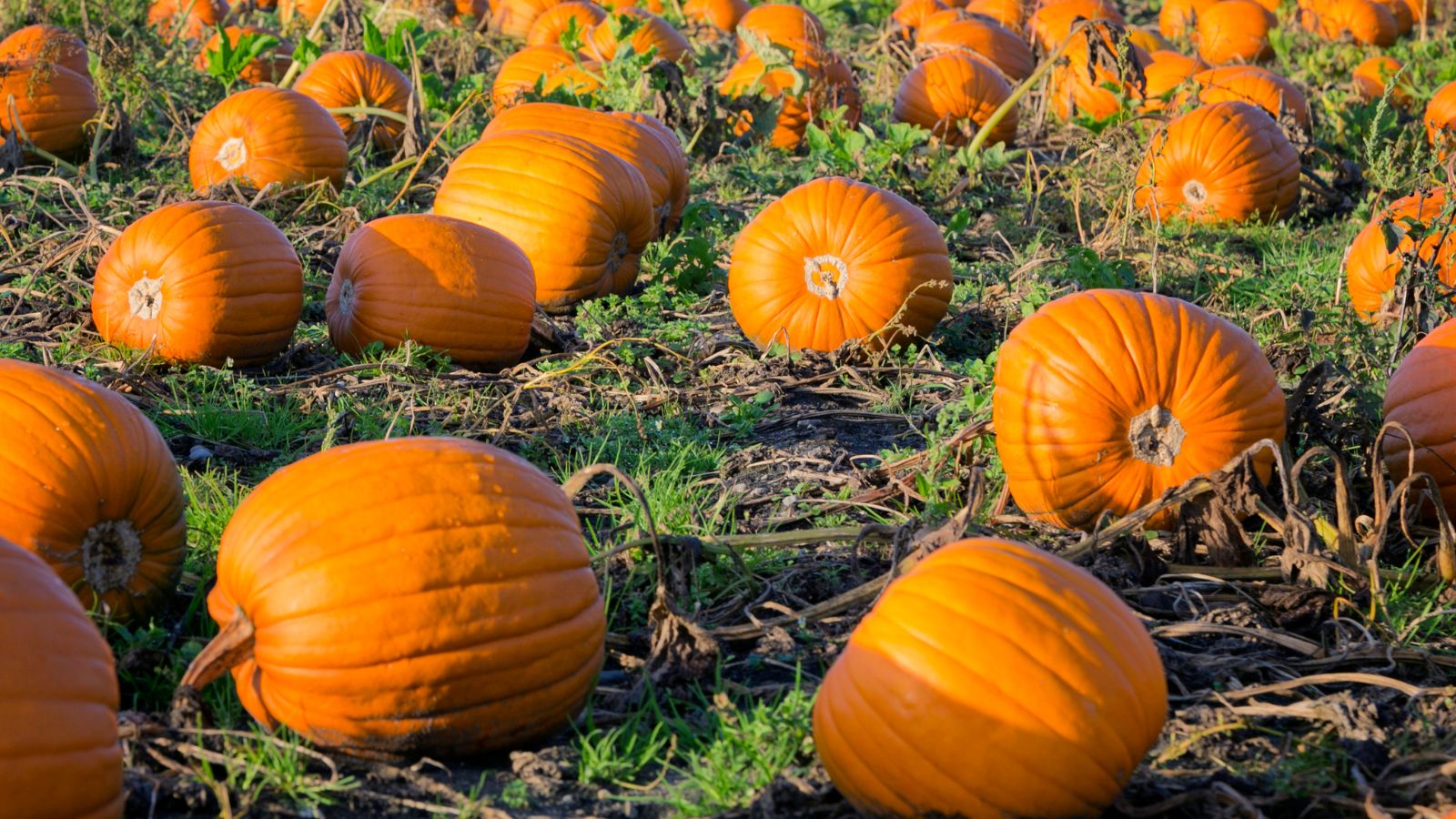
Can Chickens Eat Pumpkin Seeds? Keep Your Flock Safe
Photo Credit: Canva Pro
Can chickens eat pumpkin seeds? Yes, and they love them as a treat. Pumpkin seeds are high in protein, vitamins, and good fats. They’re a great treat for chickens, but they’re not a cure for worms.
What parts of the pumpkin are safe, how much to feed, and the truth about seeds are all covered in this article. If you raise backyard chickens, this is everything you need to know.
🎃 Elevate Your Fall Recipes – Click Here!
Can I Feed Raw Pumpkin Seeds to Chickens?
Photo Credit: Canva Pro
Nutritional Benefits of Raw Pumpkin Seeds
Pumpkin seeds are full of important nutrients that will help the health of your backyard chickens. They are a great treat for chickens that add variety and value to their diet if they are fed the right way.
Getting raw seeds from fresh pumpkins is especially helpful in the fall, when pumpkins are easy to find.
-
Rich in vitamins: Contains small amounts of vitamins A, E, and some B-complex.
-
Healthy fats and protein: Provides energy, supports egg production, and boosts growth in laying hens.
-
Loaded with minerals: High in zinc and magnesium for strong bones and feather quality.
-
Supports immune system: Helps chickens stay strong against infections and seasonal stress.
-
Fun enrichment food: Chickens love to peck at whole pumpkins and pumpkin guts, which keeps them entertained.
Guidelines for Feeding Raw Pumpkin Seeds Safely
It's okay to feed chickens pumpkin seeds as long as you do it safely. Pumpkin seeds are not a replacement for a healthy diet or medical care. Chicken keepers should treat them like any other snack that comes with the season.
-
Treat, not staple: Use pumpkin seeds as a healthy treat, not the main part of the flock's diet.
-
Use clean, unspoiled pumpkins: Always check for mold, rot, or soft spots before serving.
-
Don't rely on myths: Seeds are not a natural dewormer for poultry and should not be treated as medicine.
-
Break the pumpkin open: Helps birds reach the flesh and guts easily without struggle.
-
Keep portions small: A small handful of whole seeds is enough per chicken for the week.
Are Pumpkin Seeds a Natural Dewormer for Chickens?
Photo Credit: Canva Pro
What Scientific Studies Say About Deworming with Pumpkin Seeds
There is a lot of talk online about pumpkin seeds being a natural dewormer.. But this claim about chickens is not backed up by science. But the actual science doesn’t support this claim for chickens.
-
No solid evidence in chickens: No studies confirm that pumpkin seeds remove worms in chickens.
-
Only tested in labs or on other animals: Some results came from goats or test tubes, not birds.
-
Whole seeds not effective: Most positive results use concentrated extracts, not raw seeds from jack o lanterns.
-
Pumpkin lacks dosage control: There's no standard amount that guarantees any real deworming effect.
Why You Still Need Real Deworming Treatments
If your flock has worms, pumpkin seeds won’t cure them. When chickens have too many worms, they need real medicine. They could get sick or stop making eggs if they wait too long.
-
Not a substitute: Always use proper chicken-safe wormers like Kilverm for treatment.
-
Delays can hurt the flock: Believing in natural dewormer myths may lead to worse parasite problems.
-
No dosage control: You can’t guarantee each bird eats the same amount of seeds or gets results.
-
Treat seeds as food: They are nutritious, but not medical solutions.
-
Safer plan: Use regular worm checks and real treatments when needed.
Can Chickens Have Pumpkin Skin?
Photo Credit: Canva Pro
Is Pumpkin Skin Safe to Feed Chickens?
A chicken can eat pumpkin skin as long as it's not moldy or rotten. It has fiber and can help keep their digestive system healthy. The skin is tougher than pumpkin guts, but chickens will peck at it over time.
-
Safe if fresh: Make sure pumpkins are free from rot or mold before feeding.
-
Chickens eat most parts: They will slowly eat the skin, seeds, and flesh.
-
Avoid paint and chemicals: Never feed decorated or painted pumpkins used for halloween.
-
Works as a boredom buster: Birds enjoy pecking and scratching the skin over several days.
-
Great way to reduce waste: Reuse old pumpkins instead of throwing them out.
Best Practices for Preparing Pumpkin Skins
To keep things easy and safe for your flock, prepare pumpkin seeds the right way. This also makes it easier for your birds to absorb the nutrients in the skin and flesh.
-
Cut into halves or chunks: Makes it easier for chickens to reach the inside.
-
Remove moldy parts: If only one part is bad, cut it away before feeding.
-
Give space to peck: Place the pumpkin on clean ground or hang it for added fun.
-
Serve raw or cooked: Both options are fine—chickens love either.
-
Limit how often: Use a few times a week as part of a mixed, balanced diet.
What Are the Healthiest Seeds for Chickens?
Photo Credit: Canva Pro
Top Seeds That Boost Chicken Health
Feeding seeds can be a good way to make sure your flock gets enough nutrition. Together with commercial feed, some seeds provide important nutrients such as protein, calcium, and healthy fats that help with digestion, egg production, and energy.
-
Sunflower seeds: High in protein and vitamin e; helps with feather quality and energy.
-
Flax seeds: Rich in omega-3s for better yolk color and immune support.
-
Pumpkin seeds: Full of zinc, protein, and healthy fats and a seasonal favorite during fall.
-
Chia seeds: Boost hydration and antioxidants, great for digestive health.
-
Millet: Easy for chicks to digest; provides energy and supports growth.
Seed Treats: How Much Is Too Much?
Seeds should only be given to chickens as a treat once in a while, not as their main source of food. If you give laying hens too many seeds, especially ones that are high in fat, they may gain weight and lay fewer eggs.
-
Limit to a few times per week: Seeds should never replace full meals.
-
Offer a handful per bird: This keeps treats under control and prevents waste.
-
Support a balanced diet: Combine seeds with fresh water, greens, and feed for complete nutrition.
-
Avoid seed-only mixes: Birds need grains, protein, and vitamins from complete feed.
-
Fortified options help: Healthy blends like Happy Tract or Golden Graze add probiotics and essential nutrients.
About Our Shop – A Wellness Marketplace for Specialized Diets
Who We Are and What We Offer
FullyHealthy is a trusted source for people following unique diets. We focus on clean-label foods that are good for you and don't have any confusing ingredients or allergens. We sell everything from seasonings to baking mixes. All of our products have been checked for quality and compliance.
-
One-stop wellness shop: We focus on AIP, gluten-free, and allergen-free products
-
Trusted history: FullyHealthy is the new home of the original ShopAIP
-
Support for all phases: From elimination to reintroduction, we’ve got what you need
-
Easy online experience: Simple site design, helpful filters, no subscriptions needed
Pumpkin-Inspired Wellness: Nourishing Products from FullyHealthy
We've carefully chosen a range of pumpkin-based products that are good for you and don't compromise on taste. These seasonal treats are good for people with a range of dietary needs.
-
Farmer’s Market Organic Pumpkin (15 oz): Pure, organic pumpkin perfect for baking, soups, or AIP-friendly recipes.
-
Jack’s Paleo Kitchen Pumpkin Spice Cookies: Soft-baked, allergen-free cookies with warm pumpkin spice flavor.
-
Wild Zora Tuscan Chicken Instant Soup: A cozy blend with tomato, spinach, and pumpkin — ready in minutes.
-
Wild Zora Mushroom Beef Soup with Pumpkin & Turmeric: Savory and soothing, great for cooler days or on the go.
-
Wild Zora Roasted Pumpkin Soup with Coconut Cream: Creamy, spiced, and made for fall — just add hot water.
These options are perfect for anyone craving comfort food that still fits clean-eating goals, simple, flavorful, and pantry-ready.
Final Thoughts
Chickens eat pumpkins, butternut squash, their guts, seeds, and skin as a healthy treat that is full of nutrients they need. Many people think of pumpkin seeds as a way to keep worms away, but they’re better used for nutrition, not treatment.
Giving your chickens pumpkin seeds to eat is good for their digestion, gives them healthy fats, and keeps them busy. Just make sure tto balance the chickens diet with proper feed, seeds, and fresh water.
Which part of the pumpkin do your chickens love most?
FAQs
Can chickens eat pumpkin seeds and chickens pumpkins daily?
No, chickens eat pumpkins and pumpkin seeds as treats, not every day, for a balanced diet.
Is butternut squash safe like chickens pumpkins?
Yes, butternut squash is nutritious and safe, just like chickens pumpkins in fall feeding.
Do pumpkin seeds work as a preventative measure for worms?
No, pumpkin seeds are not a reliable preventative measure, just a nutritious snack for poultry.
Are chickens eat pumpkins guts and skin safe for hens and chicks?
Yes, chickens eat pumpkins guts and skin unless moldy, supporting digestive health and fun pecking.
What’s the benefit of feeding pumpkins as food to chickens?
Feeding pumpkins offers healthy fats, protein, and vitamins that help eggs, digestion, and flock's diet.

Leave a comment